Easements are a fact of life for many property owners, and while they are not necessarily “bad,” they are something to contend with carefully.
Easements allow utility companies and municipalities to place cables, power lines, water and sewer pipes under or over property so that property owners can have access to water, electricity, cable, and other basic necessities. While some easements also allow neighbors to share driveways, parking, and access to roads and property, in this article, I will focus on the first types of easements – those that involve eminent domain takings of private land for public use.
3 possible downsides to easements
Having an easement on your property may have some disadvantages that every property owner should be aware of.
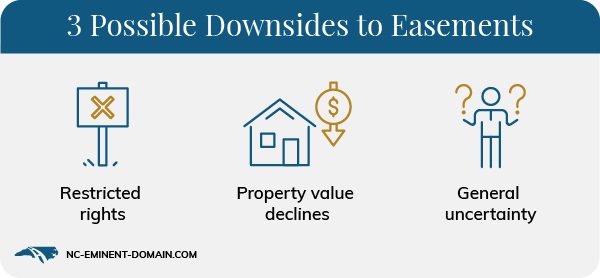
- Easements can restrict your property rights. They may restrict your use of the land in the easement area by prohibiting you from activities such as planting trees and building retaining walls or structures that could interfere with the easement holder’s access.Easements also allow the easement holder, such as the North Carolina Department of Transportation (NDCOT) or a utility company, to access the easement portion of your property for the construction, maintenance, and upkeep of a project that benefits the public. For example, this could involve excavating a large trench to install a sewer line and then later digging up that part of your property to maintain the pipe.
- Easements can also negatively affect the value of your property. Not everyone wants to buy property with an easement on it. Certain types of easements even allow a public utility or the NCDOT to install structures on your property! Overall, properties with easements may take longer to sell.
- An element of uncertainty often accompanies an easement. An easement allows for future development or usage of your property that may not be obvious today. For example, the government may only plan to install power lines now, but it might need to return at a later date to install phone and water lines, too – possibly without paying you any additional compensation for the expanded use of the easement.
Are you considering purchasing property that may have an easement taken from it in the near future? Or have you heard that land you already own may be in the path of a looming public project which will require easements?
I urge you to get a free case evaluation from an experienced eminent domain attorney who can explain your property rights and how an easement may impact your property’s value and your ability to use it.
A glossary of common terms associated with property easements
As you consider the prospect of an easement on your land and wonder “How can an easement affect my property value and rights?” it can be very helpful to become familiar with the following easement-related terms:
- dominant property (also called dominant tenement or dominant estate) – the property that uses an easement over another property. For example, if lot A had an easement over lot B to access the highway, lot A would be the dominant property.
- servient property (also called servient tenement or servient estate) – the property that is subject to an easement and benefits another parcel of land. For example, if lot A had an easement over lot B to access the highway, lot B would be the servient property.
- easement in gross – an easement which only affects a particular person and does not pass on to subsequent owners when the parcel of land is sold
- appurtenant easement or easement appurtenant – an easement that is tied to a specified parcel of land that does pass on to subsequent owners when the parcel is sold
- implied easement – an easement that arises through circumstance and is not formally written, such as when a homeowner needs to run sewer lines along his neighbor’s property to get connected to the public sewer system
- express easement – an easement that is created by an agreement or document, such as a deed
- prescriptive easement – an easement that is acquired through the long-term use of someone else’s property without formal authorization
- private easement – an easement between two individuals, commonly neighbors, that generally involves driveways, fences, or agreements for farming
- public easement – an easement put in place for the benefit of the general public
- adverse possession – a legal doctrine that allows an open trespasser to claim title and ownership rights to a property after a specified period of time based on exclusive and continuous use
Now, let’s consider the possible negative impacts on your land when it comes to three of the most common types of easements: utility easements, drainage easements, and sewer easements.
Is it bad to have a utility easement on your property?
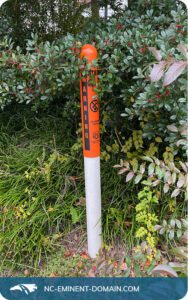
Utility companies often take utility easements when they need part of your property to provide services, such as water, cable, and electricity, to the public. These easements may also give the utility company the right to set up utility poles or towers on your property.
Utility easements also come into effect when the NCDOT has a project, such as an interstate widening, which requires existing powerlines or other utilities to be moved back onto nearby properties.
These easements are usually permanent and allow the utility company or government entity to access that part of your property for maintenance and repairs whenever necessary.
Utility easements can affect ownership and limit your ability to do certain things on your property. If, for example, you build a structure (like a fence, wall, or building) that interferes with the utility company’s ability to maintain or repair its utility, you can be required to remove it at your own expense.
If you hear that the government may be requiring utility easements for a project in your area, we can help you calculate the potential value of the utility easement for your property. Call us today at 1-877-393-4990.
Is it bad to have a drainage easement on your property?
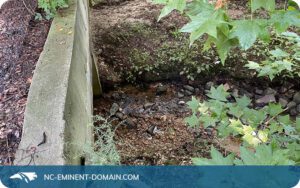
Drainage easements allow the government the right to access your property and/or drainage infrastructure (such as a drainage ditch, creek, or culvert) and alter it in order to address a water-related issue, like drainage of a road project or storm water flooding.
Sometimes, the government may need to dig a ditch or build a retention pond on your property. Sometimes, they may even require a property owner to allow water runoff to flow freely over their property.
Because this type of permanent easement is generally attached to your property, it is very important to seek compensation for all possible impacts to your property during the eminent domain process to take the easement. The government rarely provides additional compensation after a drainage easement contract is signed. An experienced eminent domain attorney can help you anticipate and calculate the potential costs of having a drainage easement on your property.
Is it bad to have a sewer easement on your property?
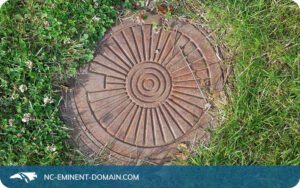
Sewer easements are a type of utility easement that are required by the government for the installation of sewer pipelines and their ongoing inspection and maintenance. While sewer easements generally benefit the public, they don’t necessarily help improve your property’s value.
As with other utility easements, the government is allowed to change its mind about how it will use the land subject to a permanent sewer easement, so what you are agreeing to now may change in the future. North Carolina law states that the government is required to compensate you for a sewer easement, but the amount is up for negotiation.
Experience in anticipating and calculating the cost implications of having a sewer easement on your land is one of the many examples of how an eminent domain attorney can help property owners. Contact us online today to talk to our eminent domain team about your easement issue.
Does my property have an easement?
There are several ways to find out if your property, or a property you are considering purchasing, has an easement.
To check for an easement, you can:
- Contact the local utility companies and ask if they have any easements on the property.
- Check with the county clerk or county land records office to find out whether the prior deed shows an easement. Request to look at a map of easement locations.
- Obtain a survey of the property to see if there are any easements and where they are located.
- Request a title search from a title company to uncover any easements.
- Obtain and review the warranty deed from the previous owner which should list any easements on the property.
How an attorney can help you protect your property easement rights
If you are considering purchasing or own property with a potential easement, your attorney can:
- explain what the easement holder is allowed to do and not allowed to do on your property
- help you fight any actions of the easement holder that exceed the easement contract
- outline your rights and responsibilities as the property owner
- answer your specific questions, such as “Are you allowed to build a fence or structure on an easement?” and if not, “How close can you build to an easement?”
If you own land and hear talk that upcoming easements may be headed your way, we can help you assess the value of an easement on your property.
To investigate any losses you may experience due to the easement, we’ll consider the:
- current and potential future use of the land
- impact of the easement on your use and enjoyment of the land
- impact of the easement on your property value
When you’re faced with an easement, we can:
- help you understand and interpret the language in the easement contract
- help protect your property rights
- seek maximum compensation for the easement
- make your case with the DOT and even take your case to court if necessary
Get a free case evaluation from the NC Eminent Domain Law Firm
Our firm is led by four former Assistant Attorneys General who have handled some of the largest and most important cases for the NCDOT. They have brought this inside knowledge and experience to our firm to help clients facing eminent domain takings. Since we’ve been in business, we’ve increased the initial offer for our clients by 3x.1
Our team knows the ins-and-outs of property easement agreements, and we fight to try to ensure that our clients don’t give up more than they must. Read how we helped one businessman facing a permanent utility easement increase the original NCDOT offer by 10x.1
See more results and client stories
If you are facing an eminent domain easement, contact us today to get your specific case evaluated at no cost and no obligation. Not only is the case evaluation free, there is no hourly fee to hire us. This means it does not cost you more to have us begin protecting your rights and looking out for your best interests as early as possible.

If your property is in its crosshairs, the government must make an offer of just compensation for the easement on your property. If we can’t get the government to increase its compensation offer to you, you pay us no fee. Guaranteed.
The following is an example of an eminent domain case with a contingency fee:
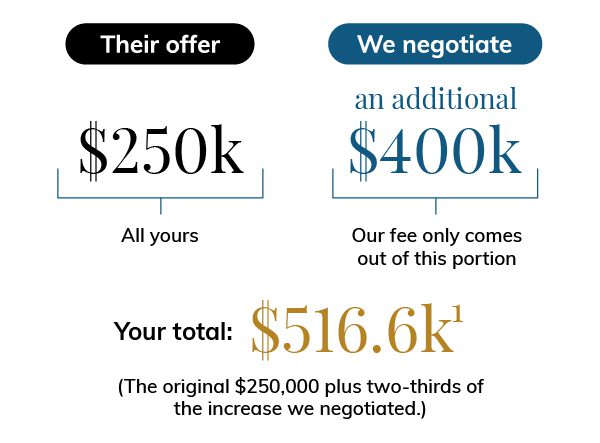
You May Also Be Interested In
Easements are anything but easy (What you don’t know CAN hurt you)
How much does hiring an eminent domain attorney cost?
10 eminent domain obstacles business owners face – and what we can do to help them

